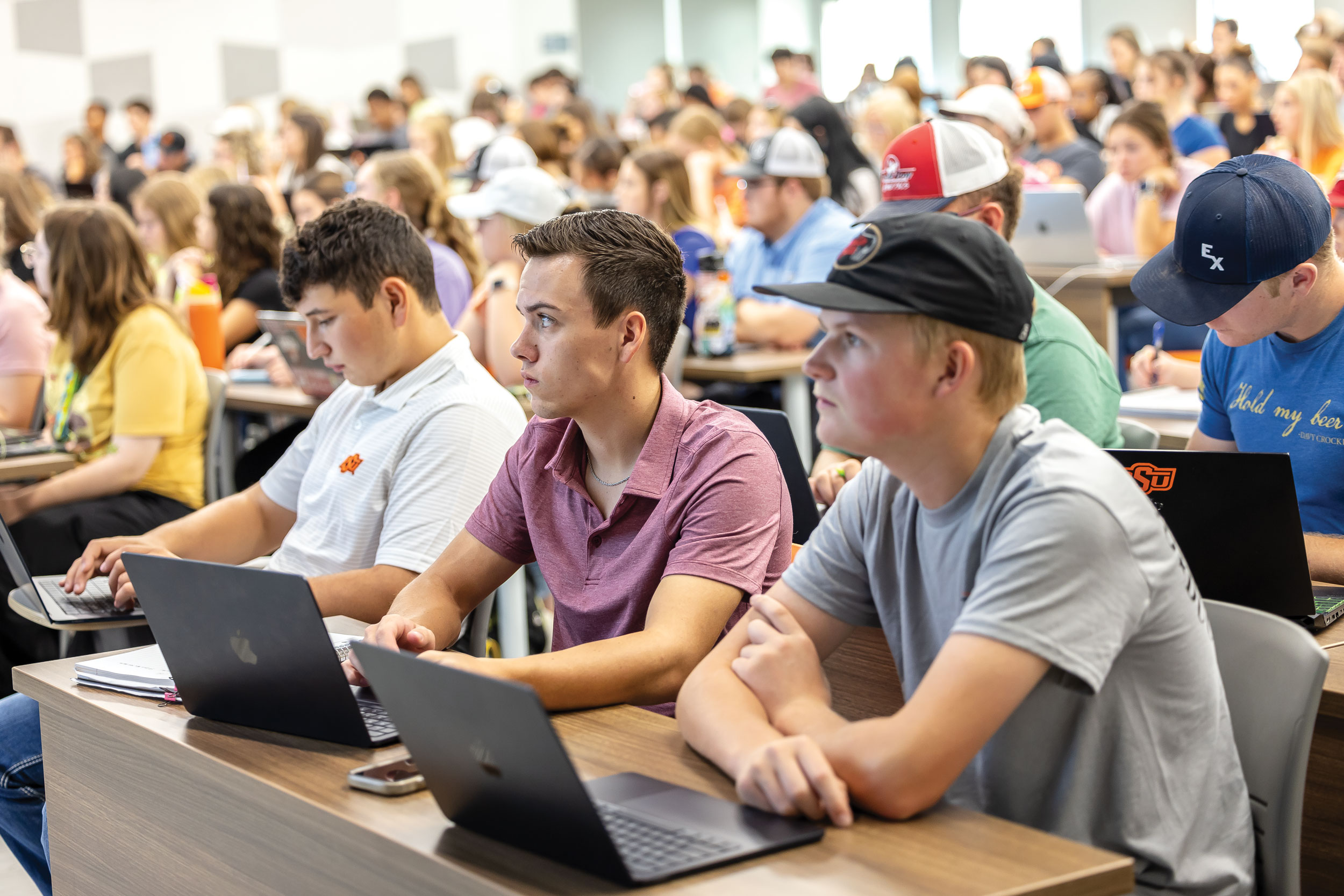
Stewards of Tomorrow: OSU launches Ideal Graduate initiative to aid student workforce preparedness
Wednesday, December 18, 2024
Media Contact: Mack Burke | Associate Director of Media Relations | 405-744-5540 | editor@okstate.edu
An Oklahoma State University degree is so much more than a piece of paper.
It’s more than the sum of its credit hours and more than a requisite line item on a resumé. It’s a gateway to personal growth and a broader perspective. It represents an investment in the future — academically, professionally and personally.
This fall, OSU launched the Ideal Graduate initiative as part of the We Are Land-Grant strategic plan. Bringing a renewed focus on developing graduates with the skills and competencies to make a positive impact in the workforce and their communities, the Ideal Graduate initiative aims to improve graduates’ workforce readiness while cultivating the next generation of servant-leaders to carry on the land-grant mission.
“OSU is committed to developing the core competencies of the Ideal OSU Graduate — professional preparedness, engaged citizenship, ethical leadership and personal responsibility,” OSU President Kayse Shrum said. “This will set our graduates up for success far beyond their time on campus. An educational approach that focuses on character building, as well as skill building and the pursuit of knowledge, will set them apart in a competitive global economy, opening doors to exciting career opportunities while also setting them apart in life as true servant-leaders, community builders and innovators.”

Employer-driven excellence
From the infancy of ideal graduate discussions, employer input was paramount to the development and success of the program.
These discussions provided direct insight into workforce needs and how the Ideal Graduate initiative could address them.
“Employers were involved from the very beginning,” said Kellie Ebert, director of OSU Career Services. “Getting these industry leaders’ thoughts on what core values they looked for in an employee and how we could develop our students in those areas was extremely important. Also, we wanted to develop a way to present that development to a potential employer in a way that made sense.”
Each industry has specific requirements and skills respective employees need to be successful in those careers, but some skills and character traits transcend career fields. During these industry meetings and discussions, themes emerged that would drive the development of the core competencies of an ideal OSU graduate.
The four foundations
While the core competencies of professional preparedness, engaged citizenship, ethical leadership and personal responsibility are rooted in the Cowboy culture, the direct, intentional conversations with industry leaders and respected employers across the state helped OSU leaders combine and synthesize those values into a singular goal: the Ideal Graduate.
The four core competencies of an OSU Ideal Graduate:
1. Professional preparedness
While professional preparedness certainly includes the mastery of core skills for a chosen career field, it also includes soft skills and intangibles that play a key role in landing a job and building a fulfilling career.
OSU graduates should demonstrate career readiness through their knowledge and experience in the pillars of professional preparedness: ability to work effectively as a team member, aptitude to solve problems through critical thinking, proficiency in written and verbal communication and demonstration of a diligent work ethic.
“We’re putting an effort into figuring out what classes we can inject into the curriculum so that our students have practical skills and they’re ready to be successful in the workplace,” said Andrew Urich, director of student development in the Eastin Center for Career Readiness.
2. Engaged citizenship
As engaged citizens, graduates should take an active role in civic life by welcoming and including global citizenship, respecting the value of dignity and healthy discourse, exercising service to the community and maintaining respectful citizenship within the digital sphere.
“Engaged citizenship means being thoughtful and intentional about how we use our resources,” said Jennifer Jones, director of the Center for Developmental Disabilities. “What we encourage and support outside of the classroom is as important or maybe more important than what we do inside the classroom.
“It’s when we engage our students in opportunities outside of the classroom that we really see the power of education come alive.”
3. Ethical leadership
Ethical leaders strive for the highest common good.
The foundation of ethical leadership is set in making decisions with integrity, exercising empathy, embracing accountability and demonstrating moral courage.
“When we frame leadership not as a title or position but as how we use our influence, it really sets us up for success,” said Joshua Taylor, director of the Hargis Leadership Institute. “We are committed to developing student leaders who have a passion for giving back and make sure that what they’re learning with their degree has an impact on their community and makes the world a bit of a better place.”
4. Personal responsibility
The ideal graduate should exhibit tenacity, adaptability and persistence, demonstrate financial literacy, commit to continuous learning and handle ambiguity with dexterity and creativity.
“We exhibit our personal responsibility through our life experiences,” said Aleigha Mariott, assistant vice president of campus life and student support. “At OSU, students that are involved outside of the classroom can gain lifelong skills, such as problem-solving and critical thinking. It’s about having self-advocacy, setting your goals and being responsible for progressing in those goals and your future.”
Tools for growth
While the Ideal Graduate initiative focuses on empowering students with the skills and character to succeed in their chosen path, it also includes a new tool to help further distinguish OSU graduates from the pack: the OSU Portfolio.
This tool will allow students to better understand the impact of their experiences while on campus and better connect them with future employers.
“This will set our graduates up for success far beyond their time on campus.”
The OSU Portfolio allows students to track and manage the development of their Ideal Graduate competencies and use meaningful reflection to make intentional, directed decisions on areas of focus. It will also enable students to frame their experiences in ways that can positively impact interviews, applications and future professional possibilities.
“The portfolio should provide an avenue for students to track their progress through the Ideal Graduate initiative throughout their time at OSU,” said Dr. Sam Emerson, associate professor of nutritional sciences and Ideal Graduate faculty fellow. “Our hope is that as students input their curricular, co-curricular or extracurricular activities manually, it will provide the opportunity to reflect on the impact those events or assignments have far beyond the duration of the event or the student’s grades.”
Putting boots on the ground
As with most things in their infancy, there is much to be observed and learned during the first semester of the Ideal Graduate initiative.
University leaders hope that as rollout continues and more students are made aware of Ideal Graduate and the OSU Portfolio, adoption and engagement rates will continue to climb.
One area of focus is identifying ways to implement the Ideal Graduate initiative in coursework and help students become familiar with the nomenclature that surrounds the program.
Dr. Howard Sanborn, political science department head, is focused on ways Ideal Graduate can help build upon a robust foundation centered around engaged citizenship.
“Students are already tasked with taking courses in American government and other related topics,” Sanborn said. “Our department’s faculty and staff are, instead, focused on ways that we can enhance and further develop the idea of engaged citizenship through courses, activities and partnerships across campus.”
The sentiment of reframing already established assets and using those as a foundation upon which to build newer, more robust offerings that challenge students to embrace the core competencies of Ideal Graduate is echoed by seemingly everyone surrounding the initiative.
The possibilities are endless for inter-departmental and even inter-campus collaborations geared toward helping students to engage and develop these skills, reinforcing classroom learning and fostering new connections in the process.
“The OSU portfolio is more than just a means to track progress through a prescriptive set of courses and activities,” Sanborn said. “It could be used to prompt meaningful discussions amongst students from different classes with similar themes and help them understand that the coursework does far more than just get them a grade in a classroom, it prepares them to be better citizens of their communities, both on campus and beyond.”
Photos by: Ellie Piper and Gary Lawson
Story by: Jeff Hopper and Mack Burke | STATE Magazine
